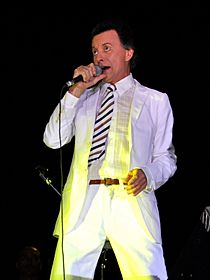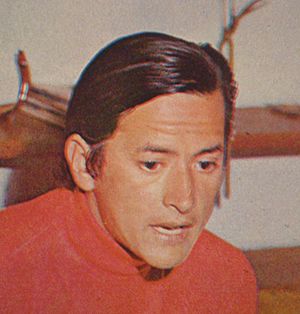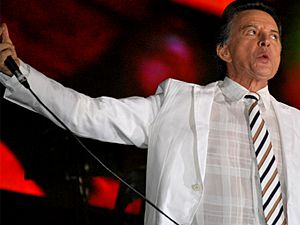Palito Ortega facts for kids
Quick facts for kids
Palito Ortega
|
|
|---|---|
 |
|
| National Senator | |
| In office December 10, 1995 – December 10, 1999 |
|
| Constituency | Tucumán |
| Governor of Tucumán | |
| In office October 28, 1991 – October 28, 1995 |
|
| Vice Governor | Julio Díaz Lozano |
| Preceded by | Julio César Aráoz |
| Succeeded by | Antonio Domingo Bussi |
| Personal details | |
| Born |
Ramón Bautista Ortega
February 28, 1941 Lules, Argentina |
| Political party | Justicialist Party |
| Spouses |
Evangelina Salazar
(m. 1967) |
| Children | 6, including Julieta, Sebastián, Emanuel and Luis |
| Profession | Musician |
Ramón Bautista Ortega (born February 28, 1941) is a famous Argentine singer and actor. Most people know him as Palito Ortega. He is a big name in Argentine music. He was one of the main stars of the "New Wave" music style in the 1960s and 1970s. He became famous around the world, especially in Latin America and Spain. This was when rock and roll music, called rock en español, became very popular with teenagers.
Contents
Palito Ortega's Life Story
Early Life and Dreams
Palito Ortega was born into a very poor family in Lules, Argentina. He started working at a young age to help his family. He sold newspapers in San Miguel de Tucumán and also worked at a store. But his biggest dream was always to become a singer. As a teenager, he really looked up to Elvis Presley.
In 1956, Ortega moved to Buenos Aires. He sold coffee in parks and on the streets. He used his coffee stand to get closer to the entertainment world. He set up his stand near Channel Seven Public Television. Many famous entertainers would buy coffee from him. This helped him meet some of the best Argentine rock musicians of that time. He also worked near Radio Belgrano, where singers he knew would recognize him.
Ortega became friends with a popular music group called "Carlinhos y su Banda." He learned to play drums during their practice sessions. Soon, he joined the band. The group became very successful across South America, and Ortega was one of their most popular members. Later, Ortega decided to leave the group to start his own solo career. He felt confident that his fame with the band would help him succeed alone.
Music and Acting Career
His first solo album was called La Edad del Amor (which means "The Age of Love"). He recorded it using the name Nery Nelson. His next album, Yo no Quiero ("I Don't Want To"), also did not become a hit. Both albums were made in Mendoza with small budgets and no big record company support. For some live shows, Ortega used another stage name, Tony Varano. He also joined a band called "The Lyons" for a short time. But he still wanted to be a successful solo singer, so he left The Lyons after a few months.
In 1962, Ortega met a songwriter named Dino Ramos. This meeting was very important for Ortega's career. Ramos would go on to write many of Ortega's hit songs. By 1963, Argentina had its own "new wave" music movement. Ortega started appearing regularly on television. He was often on a popular show called Club del Clan ("The Clan Club") on Canal 11, along with Cachita Galán.
In 1963, he signed with RCA Records and started recording music right away. His TV appearances also led him to a career in movies. Ortega recorded 27 albums and starred in 26 films during this time. He became a teen idol, meaning many young people admired him. He sang and acted in these movies. He worked with many important Argentine actors and actresses. In 1967, he married Evangelina Salazar, a TV actress. They had six children together.
Palito Ortega traveled a lot during the rest of the 1960s and 1970s. He recorded music for RCA in places like Mexico, Italy, England, and Nashville, Tennessee. In 1966, in Nashville, he recorded the hit song "Sombras" by Gil Veda. As time went on, his popularity as a teen idol lessened. He appeared less on TV and in movies, and recorded fewer albums. However, he became a successful music promoter. In August 1981, he organized a concert for Frank Sinatra in Argentina. This event caused him to lose a lot of money due to economic changes in Argentina.
In 1985, Ortega moved with his family to Miami, Florida. Miami was becoming a popular place for Latino entertainers to live. Ortega joined other famous artists like Celia Cruz and Gloria Estefan there. In 1986, Ortega sang the United States national anthem before a big boxing match.
Politics and Return to Music
After a while, Ortega stopped performing to focus on business and politics. Two of his children, Emanuel and Julieta, also became entertainers. When Emanuel moved to Mexico, Ortega decided to return to Argentina. In 1991, he was elected Governor of Tucumán Province. He won against former military Governor Antonio Domingo Bussi. One of Ortega's brothers, Juan, supported Bussi, but another brother, Luis, became Mayor of a Buenos Aires suburb.
As governor, Ortega worked closely with President Carlos Menem. He supported Menem's free market ideas. He privatized the Bank of Tucumán and the Provincial Water Authority. These actions made some people unhappy. His Vice-Governor, Julio Díaz, disagreed with Ortega. In 1993, Díaz accused the governor of ordering investigations into students and labor union officials. Ortega could not run for governor again in 1995. Instead, he was elected to the Argentine Senate. In 1999, his political party, the Justicialist Party, chose him to run for Vice-President. However, his party lost the elections that year.
Ortega left politics in 2002. He then started touring and singing again, returning to his music career.
See also
 In Spanish: Palito Ortega para niños
In Spanish: Palito Ortega para niños
- List of best-selling Latin music artists
 | William L. Dawson |
 | W. E. B. Du Bois |
 | Harry Belafonte |



